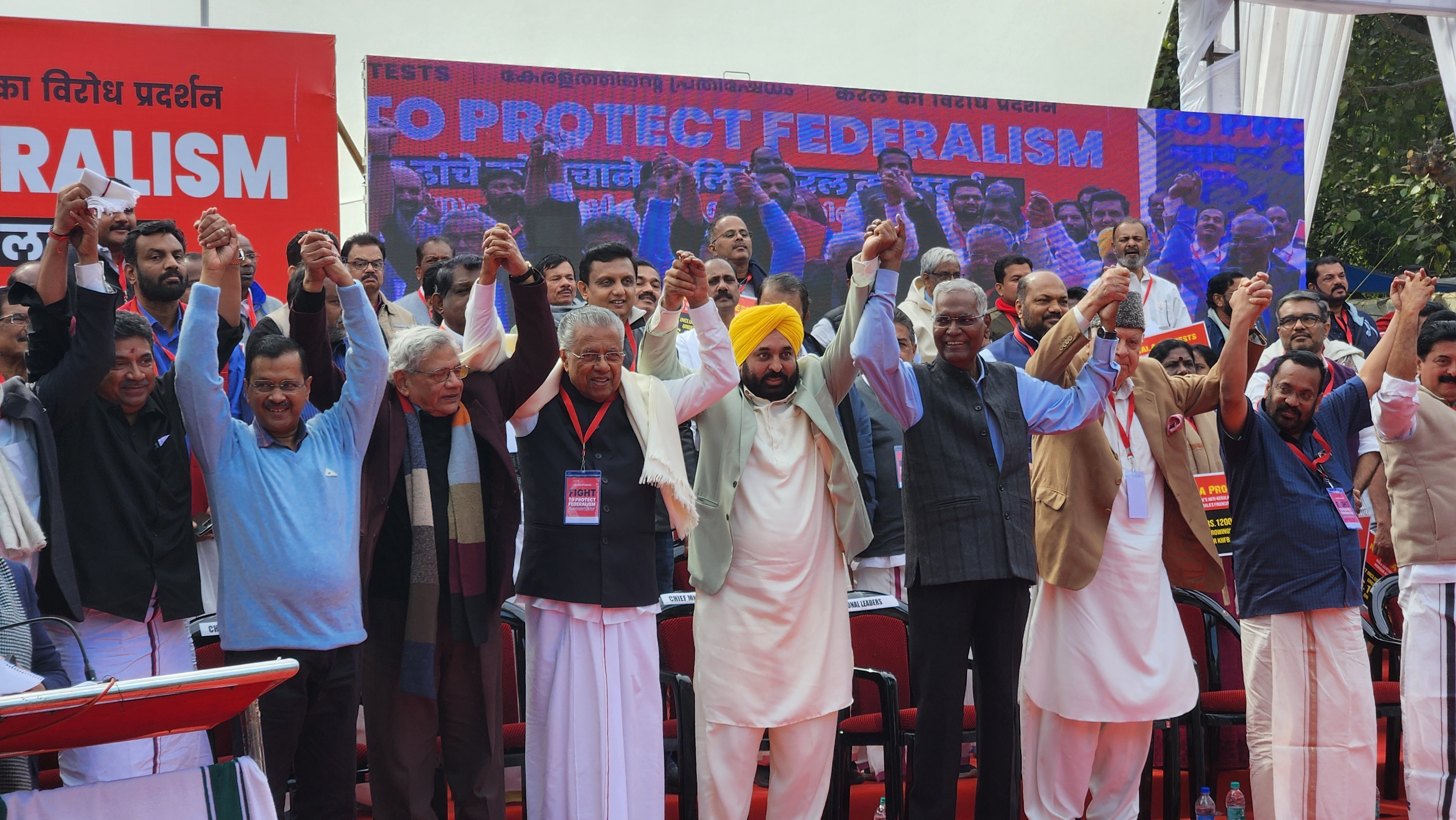
THE Kerala chief minister, Pinarayi Vijayan, the entire cabinet and all the MLAs and MPs of the Left Democratic Front sat in protest at Jantar Mantar in New Delhi on February 8. The sit-in was to highlight the central government’s discriminatory attitude to Kerala and the hostile actions of the centre to financially strangulate the state government. On the same day, big demonstrations were held over Kerala supporting the Delhi action. In various state capitals, meetings expressing solidarity with Kerala were held.
That the cabinet of an elected state government had to conduct such a protest in the capital of the country exemplifies the crisis created by the sustained assault on federalism by the Modi government.
In the case of Kerala, the union government has drastically reduced the financial support to the state. As far as tax devolution is concerned, the share given to the state has dropped from 3.875 per cent (at the time of the Tenth Finance Commission) to 1.9 per cent. Further, the union government is deliberately decreasing the divisible pool by imposing cess and surcharges. The revenue collected by the union government from cess increased from 6.4 per cent of its gross tax revenue in 2011-12 to 17.7 per cent in 2021-22, i.e., Rs 4,78,680 crores. If it had been levied as taxes, then the state governments would have got some share of this amount.
As per Article 293 of the Constitution, state legislatures have the power to fix the borrowing limit for the states. As per entry 43 of the states list, public debt is exclusively the right of the states. Despite this, the central government has been intervening to impose a net borrowing ceiling on the states and limit borrowing from all sources, including open market borrowings.
As a result of these attacks on fiscal federalism, the state has resource deficiency through the reduction of share of taxes from 3.89 per cent to 1.92 per cent; the stoppage of GST compensation and the denial of borrowings. The cumulative effect of these three measures is the loss of Rs 57,000 crore this year.
The use of centrally-sponsored schemes to encroach on states’ rights and intervening in subjects listed in the states list has also affected Kerala. The state received 85 per cent of the budgeted centrally-sponsored schemes in 2015-16. However, in 2021-22, this declined to just 40 per cent.
Along with this is the unconstitutional role of the governor in holding up bills passed by the legislative assembly and taking other obstructive positions.
This multi-pronged attack by the centre is meant to scuttle the remarkable progress made in the first term of the LDF government between 2016 and 2021. Realising that the LDF government’s policies will take Kerala forward and gain more popular support, the Modi government is resorting to these anti-democratic and anti-federal measures to stall Kerala’s development path.
Behind this approach is the Modi government’s and the BJP’s resolve to completely undermine the federal principle. The blatant discrimination against opposition-ruled states is also to prove that only a `double engine’ government – BJP at the centre and BJP government in the state – can deliver development and welfare to the people. For this brazen political motive, the BJP rulers are ready to destroy the essence of federalism.
The February 8 protest in Delhi is not a matter of Kerala alone. The issues raised are relevant for all states as the centre is bent upon turning the state into vassals and to use fiscal relations as a weapon against the opposition-run states. The drive for fiscal centralisation is part of the effort to create a unitary system. The slogan of One Nation One Election is also designed to make India a centralised, unitary polity.
It is good that the Delhi and Punjab chief ministers, Arvind Kejriwal and Bhagwant Singh Mann, former chief minister Farooq Abdullah and various leaders of the opposition parties, who are part of the INDIA bloc supported and participated in the sit-in. The Tamilnadu chief minister sent a video message of support. In contrast, the Congress leadership of Kerala took a negative position when approached to join the sit-in in Delhi.
In the coming days, the fight for states’ rights and defence of federalism should become the rallying cry of the opposition.
(February 8, 2024)


